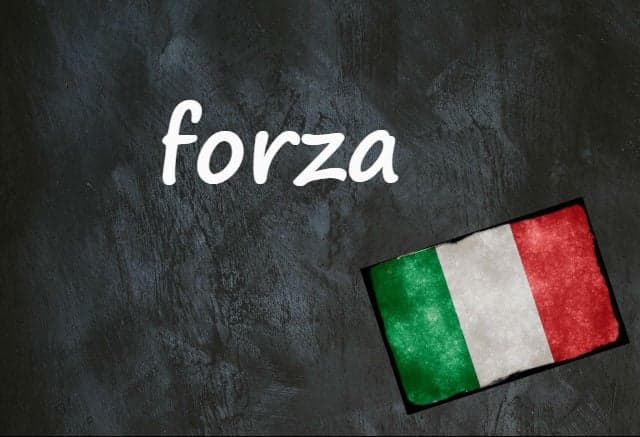
Italian word of the day: 'Forza'

The encouraging word we all need to hear right now.
Here's a word we've been hearing even more than usual lately.
One thing many of us love about Italian culture is the kindness and encouragement you get almost constantly from total strangers. "Brava!", they shout, when this foreigner manages to accomplish even the most basic of tasks.
But that generous Italian spirit is proving invaluable right now, with everyone in Italy living under quarantine - and some finding it pretty difficult.
Today's word is another you'll hear people shouting when they want to cheer you on.
Forza literally means force, or power.
But also, as one Italian dictionary puts it, "the ability to face the difficulties of life."
Used in this context, forza means something like “come on” or “you can do it!”
Almost like saying “be strong” or “you’ve got the strength to do this.”
A banner hung from a balcony reads: "Come on guys. Everything will be alright. Let's stay at home." Photo: AFP
And it’s often used along with dai, which also means “come on”.
- Dai, forza, andiamo!
- Come on, come on, let’s go!
Just like with dai, you need to say this word with plenty of conviction.
The verb forzare meanwhile is used to talk about being forced to do something, much like you would in English:
- hanno forzato la mia volontà
- they forced me into it
And the phrase per forza can mean the same thing:
- l'ha fatto per forza
- he was forced to do it
Confusingly, the very same phrase can also be used as an adverb to mean “obviously,” “of course” or “necessarily”
- Non dovete dire qualcosa per forza.
- You don't have to say anything, obviously.
- Se lo chiedi così, per forza dirà di sì.
- If you ask like that, of course he'll say yes.
It’s always a very useful word to have in your vocabulary. But when times get hard, it's absolutely essential. Maybe it's just me, but even just saying it loud makes me feel a bit more capable.
Forza!
Do you have a favourite Italian word you'd like us to feature? If so, please email us with your suggestion.
Comments
See Also
Here's a word we've been hearing even more than usual lately.
One thing many of us love about Italian culture is the kindness and encouragement you get almost constantly from total strangers. "Brava!", they shout, when this foreigner manages to accomplish even the most basic of tasks.
But that generous Italian spirit is proving invaluable right now, with everyone in Italy living under quarantine - and some finding it pretty difficult.
Today's word is another you'll hear people shouting when they want to cheer you on.
Forza literally means force, or power.
But also, as one Italian dictionary puts it, "the ability to face the difficulties of life."
Used in this context, forza means something like “come on” or “you can do it!”
Almost like saying “be strong” or “you’ve got the strength to do this.”
A banner hung from a balcony reads: "Come on guys. Everything will be alright. Let's stay at home." Photo: AFP
And it’s often used along with dai, which also means “come on”.
- Dai, forza, andiamo!
- Come on, come on, let’s go!
Just like with dai, you need to say this word with plenty of conviction.
The verb forzare meanwhile is used to talk about being forced to do something, much like you would in English:
- hanno forzato la mia volontà
- they forced me into it
And the phrase per forza can mean the same thing:
- l'ha fatto per forza
- he was forced to do it
Confusingly, the very same phrase can also be used as an adverb to mean “obviously,” “of course” or “necessarily”
- Non dovete dire qualcosa per forza.
- You don't have to say anything, obviously.
- Se lo chiedi così, per forza dirà di sì.
- If you ask like that, of course he'll say yes.
It’s always a very useful word to have in your vocabulary. But when times get hard, it's absolutely essential. Maybe it's just me, but even just saying it loud makes me feel a bit more capable.
Forza!
Do you have a favourite Italian word you'd like us to feature? If so, please email us with your suggestion.
Join the conversation in our comments section below. Share your own views and experience and if you have a question or suggestion for our journalists then email us at [email protected].
Please keep comments civil, constructive and on topic – and make sure to read our terms of use before getting involved.
Please log in here to leave a comment.